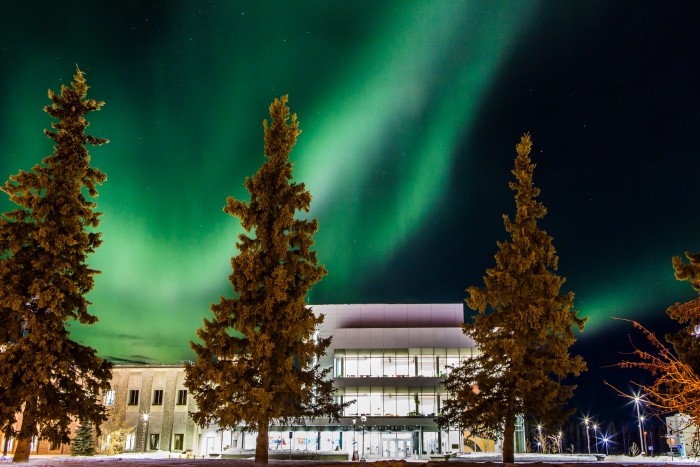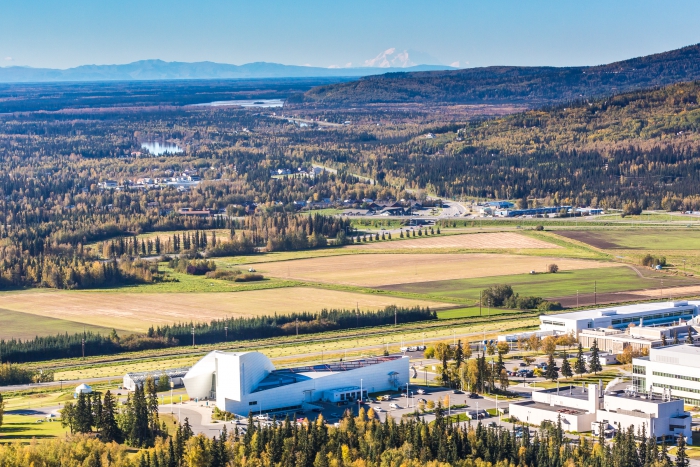By: Larry D. Hinzman, Vice Chancellor for Research, Professor of Civil and Environmental Engineering, University of Alaska Fairbanks.
The University of Alaska and the Alaskan Host Committee to the Arctic Council will convene the 2017 Week of the Arctic in Fairbanks and Anchorage, Alaska during the week of 8-14 May 2017. The schedule will include symposiums, panel discussions, workshops, cultural events and community public presentations all intended to advance the scientific and technical understanding of Arctic policy, human-environmental interactions, and stakeholder information needs. This series of events will present a significant and timely opportunity to demonstrate the achievements of the U.S. scientific community, while planning and engaging in the coordination of future research efforts in this dynamic region of the planet.

The Arctic is critical to understanding the Earth system. It is intimately connected to the oceans and global air masses, which affects continents and terrestrial environments near and far. The Arctic is home to about four million people, and has increasing relevance to governments, corporations, and individuals around the world. Environmentally and societally, the Arctic is changing more rapidly than almost any place on Earth, providing unprecedented opportunity and urgency to study the region. Our abilities to understand, predict, and respond to changes in the Arctic are of increasing strategic interest to the United States, emphasized by the release of the Implementation Framework for The National Strategy for the Arctic Region and throughout the U.S. Chairmanship of the Arctic Council, which will transfer to Finland this May. The impacts of melting sea ice, thawing permafrost, and ecosystem reorganization—together with the associated human interactions—represent issues so complex that they cannot be adequately addressed in isolation. No one country is able to support the breadth and depth of research necessary to keep pace with the changing Arctic, and therefore it is necessary and prudent to gather researchers and key stakeholders from around the Arctic and the world to share their observations and intentions, as well as their understandings and their challenges, so that we may make greater scientific advances, more informed decisions, and better use of limited research and planning resources.
The Week of the Arctic's meetings will be held concurrently, but separately, with the celebration of the Arctic Council Ministerial meeting with the official transfer of the chairmanship to Finland. The U.S. can be deservedly proud of the many products and accomplishments that resulted from its two-year chairmanship, which will be highlighted throughout many of the meeting's scientific workshops and symposia. For example, RISING SUN (Reducing the Incidence of Suicide in Indigenous Groups – Strengths United through Networks), is an initiative under the U.S. Chairmanship that has furthered the mental health work of the Arctic Council by developing an evaluation toolkit for suicide prevention efforts that assesses the primary factors associated with successful suicide prevention across Arctic nations.
Week of the Arctic will provide opportunities to widely share ideas as very distinct communities converge for open discussions, sharing of understanding, and planning and coordination of future collaborative efforts. Facilitated workshops and panels will engage Arctic field researchers and modelers to ensure that knowledge and process understanding are translated to the policy community and the broader public through the participation of many journalists from across the nation and around the world. These meetings will convene a confluence of stakeholders from different sectors, disciplines, and responsibilities. Interaction amongst these groups will facilitate understanding, promote sharing of resources, and increase the number of accomplishments that may be achieved with limited funding for Arctic science. Such coordination enables alignment of priorities across nations, commitments to open access to data archives, and a reinvigorated enthusiasm to cooperate in studying one of the most remote places on the planet.
More information and registration is available on the 2017 Week of the Arctic website.

